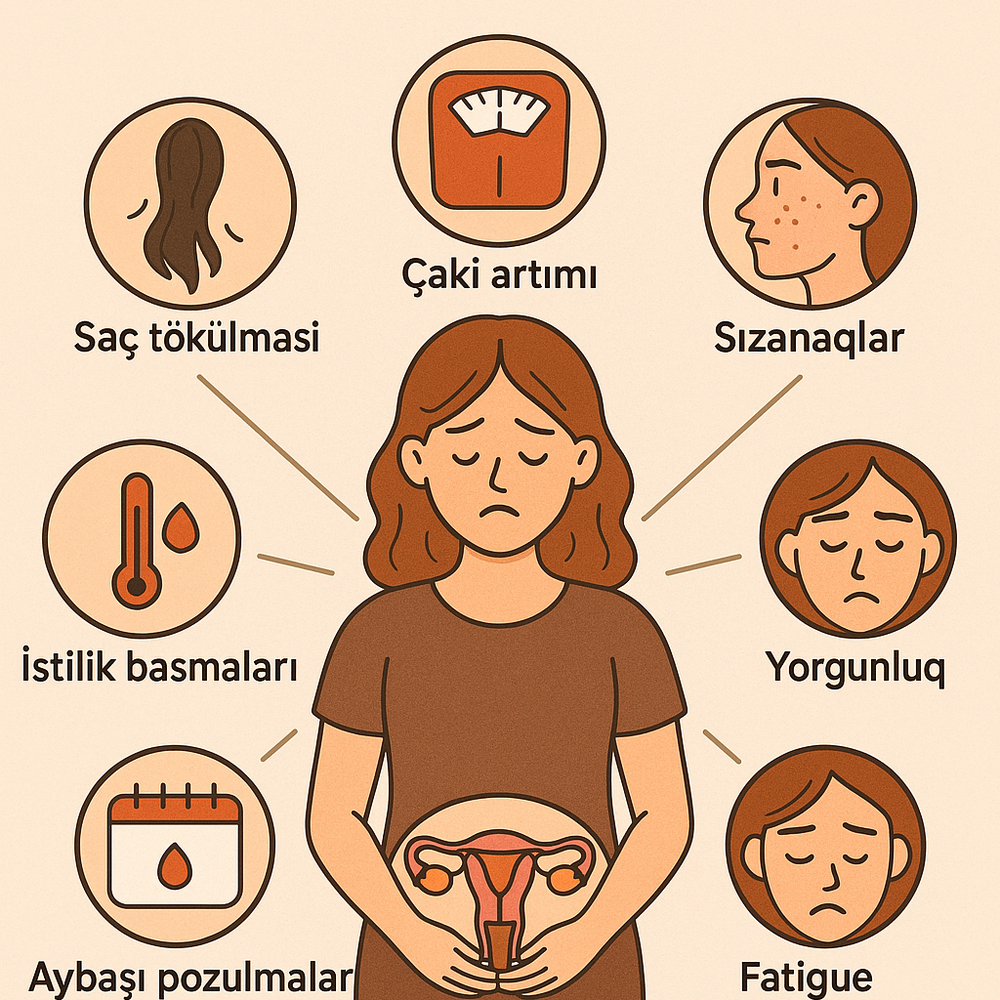Introduction
The hormonal system is a regulatory mechanism in the human body. In women, this system is particularly complex and sensitive. Hormones such as estrogen, progesterone, testosterone, prolactin, follicle-stimulating hormone (FSH), luteinizing hormone (LH), insulin, cortisol, and thyroid hormones play vital roles in maintaining women's health. An imbalance in these hormones can manifest through various physical, emotional, and psychological symptoms.
This article provides an in-depth explanation of the primary symptoms, causes, diagnosis, and treatment methods of hormonal imbalances in women.
I. Overview of the Hormonal System
The hormonal system operates through biochemical substances—hormones—secreted by endocrine glands. In women, these hormones regulate the menstrual cycle, reproductive function, mood, sleep, metabolism, and the health of skin and hair.
Key female hormones:
-
Estrogen: Regulates menstruation, breast development, and bone health.
-
Progesterone: Plays a crucial role in pregnancy and menstruation.
-
Testosterone: Though present in smaller amounts, it affects libido and muscle structure.
-
Prolactin: Essential for breast development and milk production.
-
Thyroid hormones: Regulate metabolism and energy levels.
-
Cortisol: Known as the stress hormone; imbalanced levels can lead to significant disorders.
II. Primary Symptoms of Hormonal Imbalance
-
Menstrual Cycle Disorders
-
Short or prolonged cycles (polymenorrhea or oligomenorrhea)
-
Complete cessation of menstruation (amenorrhea)
-
Painful menstruation
-
Bleeding between periods
These issues may stem from imbalances in estrogen and progesterone.
-
-
Skin Problems
-
Acne (especially on the chin and cheeks)
-
Excessively oily skin
-
Dry and flaky skin
-
Changes in skin pigmentation
Increased androgen levels can affect the skin.
-
-
Weight Changes
-
Rapid and unexplained weight gain
-
Difficulty losing weight
-
Fat accumulation around the abdomen
-
Increase in cellulite
Particularly linked to insulin resistance and low thyroid hormone levels.
-
-
Mood Changes and Psychological Symptoms
-
Tension, depression, anxiety
-
Frequent mood swings
-
Panic attacks
-
Insomnia or excessive sleepiness
Cortisol and serotonin levels are significant factors here.
-
-
Changes in Libido
-
Decreased sexual desire
-
Vaginal dryness
-
Pain during intercourse
Testosterone and estrogen balance plays a key role.
-
-
Hair and Nail Issues
-
Hair loss or thinning
-
Oily hair
-
Increased body hair (hirsutism)
-
Brittle nails
Elevated androgen levels can cause these symptoms.
-
-
Sleep Problems
-
Frequent nighttime awakenings
-
Waking up tired
-
Difficulty falling asleep
Melatonin, cortisol, and estrogen influence sleep patterns.
-
-
Other Symptoms
-
Breast pain or size changes
-
Milk secretion (due to high prolactin levels)
-
Heart palpitations
-
Changes in body temperature
-
Memory issues and difficulty concentrating
-
III. Primary Causes of Hormonal Imbalance
-
Stress: Elevates cortisol levels, disrupting other hormonal balances.
-
Nutritional deficiencies: Lack of proteins, fats, vitamins, and minerals.
-
Sleep deprivation: Interferes with the normal secretion of melatonin and other hormones.
-
Underlying health conditions: Ovarian cysts, hypothyroidism, hyperprolactinemia, PCOS.
-
Environmental factors: Exposure to chemicals, pesticides, plastic products (especially BPA).
-
Postpartum hormonal changes
-
Excessive or insufficient physical activity
-
Aging and menopause: Sharp changes in estrogen levels.
IV. Common Types of Hormonal Disorders
-
Polycystic Ovary Syndrome (PCOS)
-
Most prevalent hormonal disorder.
-
Symptoms: menstrual irregularities, acne, excessive hair growth, weight gain.
-
-
Hypothyroidism
-
Deficiency of thyroid hormones.
-
Symptoms: cold intolerance, fatigue, weight gain, dry skin
-
-
Hyperprolactinemia
-
Excessive secretion of prolactin.
-
Leads to missed periods, milk secretion, decreased libido.
-
-
Endometriosis
-
Estrogen-related disorder.
-
Can cause severe menstrual pain and infertility.
-
-
Menopause and Perimenopause
-
Occurs after age 45 with a gradual decline in estrogen.
-
Typical symptoms: hot flashes, insomnia, mood changes.
-
V. Diagnosis
To diagnose hormonal imbalances, the following are utilized:
-
Blood tests: Measure levels of estrogen, progesterone, testosterone, FSH, LH, prolactin, TSH, insulin.
-
Ultrasound examination: Assess the condition of ovaries and uterus.
-
Thyroid function tests: Evaluate TSH, T3, T4 levels.
-
Glucose tolerance test
-
MRI or CT scans: If a pituitary tumor is suspected.
VI. Treatment Methods
-
Hormonal Therapy
-
Estrogen and progesterone replacement therapies (especially during menopause).
-
Anti-androgen medications (for hirsutism and acne).
-
Thyroid hormone replacements.
-
-
Herbal and Natural Remedies
-
Maca root, black currant extract, chamomile, saffron.
-
Supplements: Omega-3, zinc, magnesium.
-
-
Diet and Lifestyle Changes
-
Avoidance of sugar and artificial additives.
-
Exercise: yoga, pilates, walking.
-
Ensuring quality sleep.
-
-
Psychological Support
-
Consultation with a psychologist or psychotherapist.
-
Stress management techniques (breathing exercises, meditation).
-
VII. Consequences of Not Maintaining Hormonal Balance
-
Infertility
-
Increased risk of miscarriage during pregnancy
-
Osteoporosis
-
Hypertension and diabetes
-
Liver and cardiovascular issues
-
Insulin resistance and type 2 diabetes
VIII. Tips for Maintaining Hormonal Health
-
Regular health check-ups and tests
-
Living in harmony with nature and one's body
-
Minimizing stress
-
Avoiding harmful habits
-
Increasing physical activity
-
Consuming organic foods
-
Protecting against environmental toxins (paying attention to cosmetic products and plastic packaging)
Conclusion
The female body is inherently dynamic, built upon a delicate balance. Hormonal imbalances can disrupt this equilibrium, adversely affecting both physical and psychological aspects of a woman's life. Recognizing symptoms early, obtaining an accurate diagnosis, and pursuing appropriate treatment can effectively manage these disorders.
Reader's Question and Feedback:
Have you experienced any of these symptoms? What changes in your lifestyle have improved your hormonal balance? Share your experiences with us!

